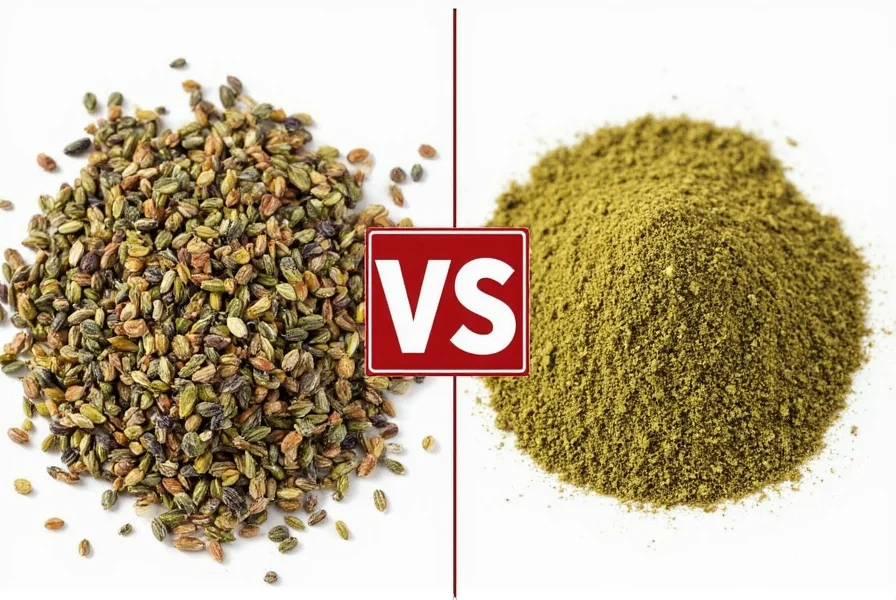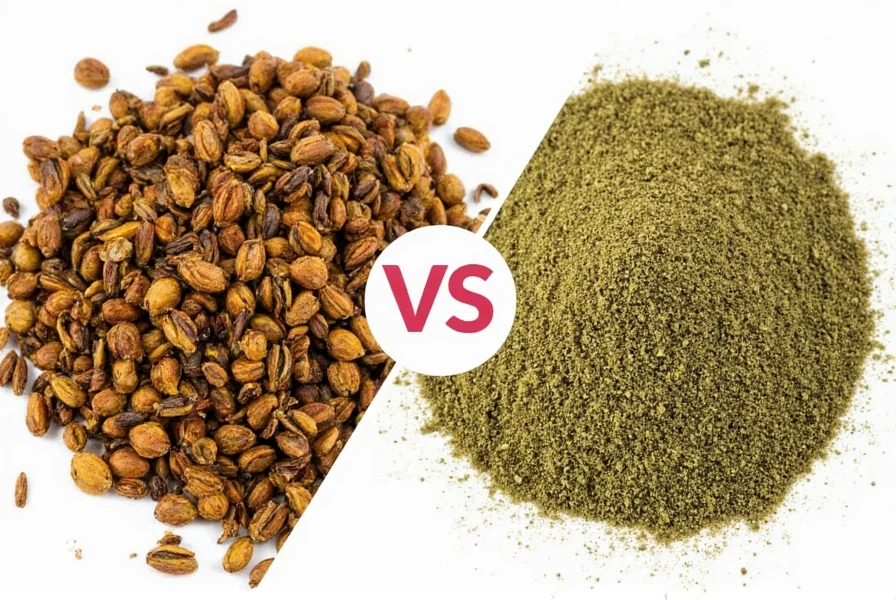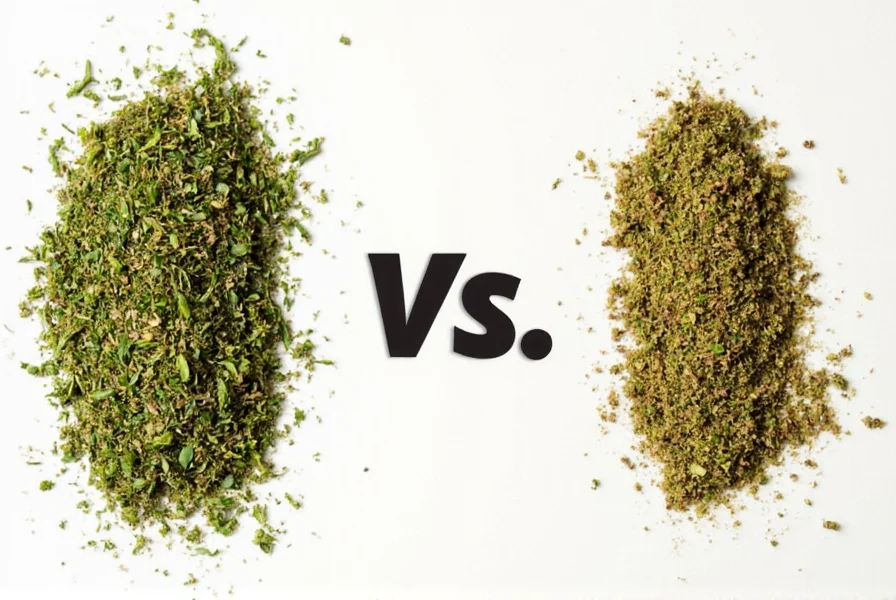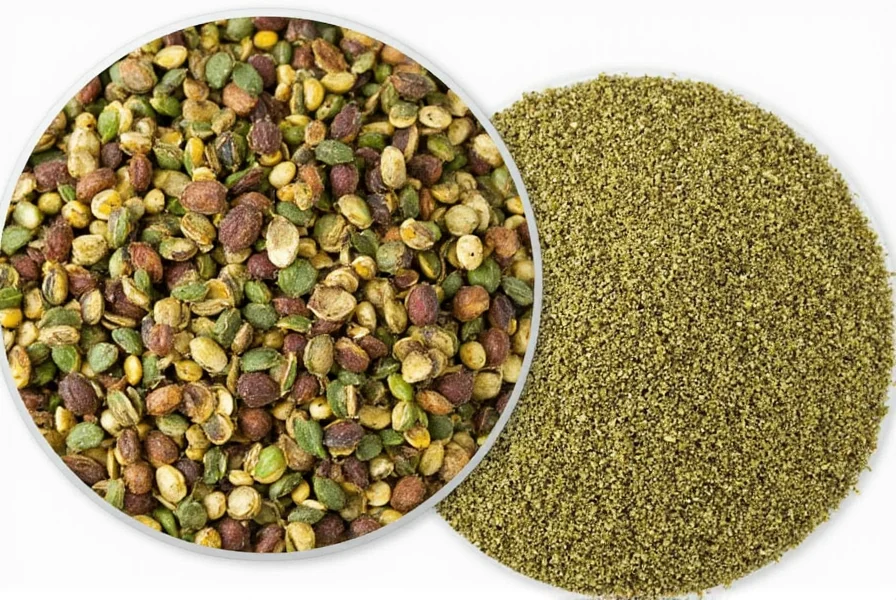Yes, you can substitute dried oregano for ground oregano (and vice versa), but with one critical rule: 1 teaspoon dried whole leaf oregano equals approximately ¾ teaspoon ground oregano. This conversion ratio matters because ground oregano delivers 25-30% more intense flavor due to increased surface area exposing essential oils. Understanding this difference prevents ruined dishes and wasted spices.
Here's what you need to know immediately about dried oregano vs ground oregano:
- Flavor intensity: Ground oregano is 25-30% stronger than whole leaf
- Best for baking: Ground oregano for even distribution in doughs
- Best for slow cooking: Dried leaves release flavor gradually
- Substitution rule: Use 25% less ground oregano when replacing dried
- Shelf life: Both last 1-3 years, but ground loses potency 30% faster

Flavor Comparison: Why the Strength Difference Matters
When comparing dried oregano vs ground oregano, the grinding process fundamentally changes flavor dynamics. Ground oregano's increased surface area releases 25-30% more essential oils immediately, creating a sharper, more pungent profile. Dried whole leaves release flavor gradually during cooking, making them ideal for dishes simmering 30+ minutes.
Dried Oregano (Whole Leaves)
- Flavor development: Gradual release over cooking time
- Best ratio: 1 teaspoon per serving in long-cooked dishes
- Visual impact: Adds rustic texture to finished dishes
- When to add: Early in cooking process for slow infusion
Ground Oregano
- Flavor impact: Immediate, concentrated burst of flavor
- Best ratio: ¾ teaspoon per serving (use 25% less than dried)
- Visual impact: No visible specks, seamless integration
- When to add: Mid-cooking or as finishing spice for quick dishes

The Ultimate Substitution Guide
Most cooking disasters happen when people use equal amounts of dried and ground oregano. Follow these precise substitution guidelines:
| If Recipe Calls For | Substitute With | Pro Tip |
|---|---|---|
| 1 tsp dried oregano | ¾ tsp ground oregano | Add ground oregano later in cooking to prevent overpowering |
| 1 tsp ground oregano | 1¼ tsp dried oregano | Crush dried leaves between fingers before adding for faster infusion |
| Pizza seasoning blend | 2 parts dried oregano + 1 part ground oregano | Ground provides base flavor, dried adds texture and aroma |
| Marinades | 100% ground oregano | Liquid can't penetrate dried leaves effectively |
| Slow-cooked tomato sauce | 100% dried oregano | Leaves soften and release flavor gradually over time |
When to Choose Each Type: The Professional Chef's Decision Tree
Culinary professionals select between dried oregano vs ground oregano based on these specific criteria:
Use Dried Whole Leaf Oregano When:
- You're making dishes with 30+ minutes cooking time (stews, braises, ragùs)
- Visual presentation matters (pasta dishes, finished pizzas)
- Creating layered flavor profiles with other whole herbs
- Working with oil-based sauces (dried leaves absorb oil better)
- Wanting a more nuanced, complex flavor development
Use Ground Oregano When:
- Preparing baked goods (bread, focaccia, pizza dough)
- Making dry rubs for meats (even distribution is critical)
- Creating marinades (ground form dissolves in liquids)
- Cooking quick sautés under 15 minutes
- Wanting maximum flavor impact with minimal quantity

Precision Storage Techniques for Maximum Potency
Ground oregano loses potency 30% faster than dried leaves due to oxidation. Follow these storage protocols:
Dried Oregano Storage Protocol
- Store in dark glass containers (amber or cobalt)
- Maintain temperature below 70°F (21°C)
- Keep away from spice grinder (vibrations degrade leaves)
- Test freshness: Rub between fingers - strong aroma = good quality
- Peak flavor window: 12-18 months
Ground Oregano Storage Protocol
- Use containers with oxygen-absorbing caps
- Store upright (prevents settling and caking)
- Never store above stove or near dishwasher
- Test freshness: Taste - bitter notes indicate degradation
- Peak flavor window: 9-12 months
Professional Buying Guide: What Food Scientists Recommend
When comparing dried oregano vs ground oregano products, look for these specific markers:
Dried Oregano Quality Indicators
- Color: Vibrant green (brown indicates age)
- Texture: Crisp but not brittle (shouldn't crumble when touched)
- Aroma test: Strong, clean scent when crushed
- Origin: Mediterranean varieties have higher carvacrol content
- Best value: $6-8 per ounce for organic, non-irradiated
Ground Oregano Quality Indicators
- Consistency: Fine, uniform powder (no clumps)
- Color: Deep green (gray indicates oxidation)
- Aroma test: Immediate strong scent when container opened
- Origin: Look for "freshly ground" on label
- Best value: $7-10 per ounce for premium grades
| Comparison Factor | Dried Oregano | Ground Oregano |
|---|---|---|
| Flavor Strength | Moderate (1x) | Strong (1.25-1.3x) |
| Substitution Ratio | 1 tsp = 1 tsp | ¾ tsp = 1 tsp dried |
| Best for Pizza | Finishing/topping | Dough/sauce integration |
| Peak Flavor Duration | 12-18 months | 9-12 months |
| Optimal Addition Time | Early in cooking | Mid to late cooking |
| Cost per Flavor Unit | Lower | Higher (but more efficient) |

Critical FAQ: What Top Chefs Won't Tell You
Why does ground oregano taste stronger than dried?
The grinding process breaks cell walls, releasing 25-30% more essential oils immediately. This creates a more intense initial flavor impact. Food science studies show ground oregano delivers 1.25-1.3x the flavor compounds per teaspoon compared to whole leaves. However, in dishes cooking over 30 minutes, dried leaves can match this intensity as they gradually release their oils.
What's the biggest mistake people make with oregano substitution?
Using equal amounts of dried and ground oregano. This results in either under-seasoned dishes (when using dried instead of ground) or overpowering, bitter flavors (when using ground instead of dried). Always adjust by 25%: 1 tsp dried = ¾ tsp ground. Professional kitchens keep conversion charts visible near spice stations to prevent this common error.
Which is better for tomato-based sauces: dried or ground oregano?
For sauces simmering under 20 minutes: use ground oregano (¾ tsp per cup of sauce). For sauces cooking 30+ minutes: use dried leaves (1 tsp per cup). The extended cooking time allows dried leaves to fully hydrate and release flavor gradually, creating more complex notes. Many professional Italian chefs use a combination: ½ tsp ground at start for base flavor + ½ tsp dried in last 10 minutes for fresh aroma.
Does organic matter for oregano?
Yes, significantly. Studies show organic oregano contains 15-20% higher concentrations of carvacrol (the primary flavor compound). Conventional oregano often undergoes irradiation that degrades essential oils. For maximum flavor impact, choose organic oregano stored in dark glass containers away from light exposure. The price difference ($1-2 more per ounce) delivers noticeable quality improvement in finished dishes.
Pro Chef's Final Recommendation
Every serious kitchen needs both forms of oregano, but use them strategically. Keep ground oregano for baking and quick applications where even distribution matters. Maintain dried whole leaf oregano for slow-cooked dishes where gradual flavor release creates complexity. Most importantly, always adjust quantities using the 1:¾ ratio rule - this single practice prevents 90% of oregano-related cooking mistakes. Remember: oregano should enhance, not dominate, your dish. When properly used, it creates that authentic Mediterranean flavor profile everyone loves without overwhelming other ingredients.











 浙公网安备
33010002000092号
浙公网安备
33010002000092号 浙B2-20120091-4
浙B2-20120091-4